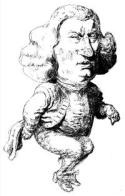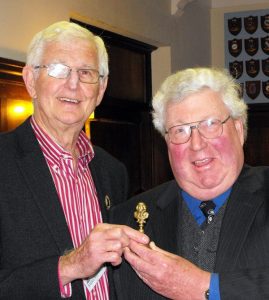Johnson’s Dictionary: An Anthology, ed. David Crystal. Penguin Books, London 2005. xlvi + 650 pp. RRP $39.95
From being for practical purposes unavailable to most people, Johnson’s Dictionary of the English Language is suddenly more available now than it has been for a century or so. The book’s 250th birthday in 2005 has had something to do with this. The full-text is available on a number of C.D.s-ROM and online. David Crystal, who is probably the world’s best-known and most prolific linguistic scholar, has made this Penguin Classics edition, which is the second of two recently-published volumes of selections from the great book.
It is good that this major work of a major writer, and a pioneering work of its kind, is available – albeit in truncated form – to modern readers, as a book. No conscientious selection from such a work could fail to please; perhaps the best way to review Crystal’s edition is not to retail truisms about the Dictionary itself, but to compare this edition with that of Jack Lynch, Samuel Johnson’s Dictionary, which came out in 2002.
The two seem roughly comparable in terms of size, but Crystal’s contains (so the blurb claims) 4,000 of the approximately 43,000 entries in the original editions, whereas Lynch’s gives 3,100. Crystal’s is an agreeably tubby little hardback volume, and – being a Penguin – is cheaper than Lynch’s, and more readily obtainable through traditional means. Both editions include complete Dictionary entries, giving all the senses of the chosen words, and all the illustrative quotations. Both also include Johnson’s Plan of a Dictionary and the famous Preface.
The most difficult part of the Dictionary to say anything about is, as many scholars have found, the core of it: the A to Z sequence of words. I hoped I might get some useful insight by comparing a sample of the original with the two selections, so I took four 3-page sequences from the letters B, E, M and W. These pages in Johnson included a total of 215 headwords: Crystal gives 20 of them, Lynch 13. There being so few, we can easily list them.
Lynch: blatant, blatteration, eftsoons, egotism, egregious, ejaculation, manubial, to manumit, manuscript, March, wag, to waggle, and wair.
Crystal: to blandish, e.g., egotism, to egotize, ejectment, eigh, eight, eighth, elbowchair, elbowroom, manual, manufacture, manufacturer, to manure, manylanguaged, manytimes, margin, wad, and waggery.
The main finding is that, in this sample, the two selections coincide only once (egotism); of which the practical conclusion is that people looking for such a book should buy both! But I think we can also see that Crystal, as a linguist, is looking (at least in part) for examples of different kinds of words, hence the ego-, eigh-, elbow-, manufactur-, and many- groups; whereas Lynch is looking for words interesting in themselves; Crystal gets points for eigh (“an expression of sudden delight”) and margin (how could Lynch overlook a word that has become so tediously ubiquitous in cutting-edge Lit.Theory?), but for students of literature and of Johnson, Lynch scores with blatteration (“noise; senseless roar”), eftsoons, egregious, manuscript and wag. But perhaps a different or larger sample would yield different results.
Crystal has 10 pp. of 245 notes to his selection, most of which give additions and alterations made by Johnson in the revised 4th edition, which Lynch does not deal with; Lynch has 19 pp. of 150 notes, which are mostly discursive, giving biographical and other contextual information.
An important virtue of Lynch’s edition is the inclusion of a number of indexes: two to the sources of the illustrative citations (Shakespeare, and everyone else), which were one of the glories of the Dictionary, and the inclusion of which was his original contribution to English lexicography. In another index, Lynch classifies the headwords according to 28 categories, which suggest his principles of selection: inkhorn terms, cant words, food and drink, insults, literature, religion, sex, etc. These indexes greatly enhance the book’s usability, as something other than simply a book for browsing.
Crystal includes, among his prefatory materials, Boswell’s account from the Life of Johnson of the making of the Dictionary, which is certainly not the most accurate that could now be given. Crystal’s expertise is apparent in his introduction, and he certainly notices things about the Dictionary that Lynch does not; but his area of expertise is not Samuel Johnson, and he seems to have made little effort to bone up on the recent scholarship.
All in all, Crystal’s is a thorough and thoughtful selection, which being larger and slightly cheaper than Lynch’s is probably better value for money. But I suspect that for Johnsonians the latter is a more rounded, self-contained and companionable book.


